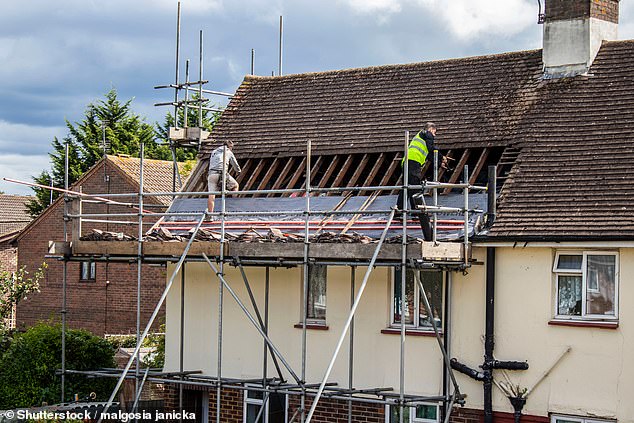Table of Contents
- In the last six months, Checkatrade has rejected a record 668 traders
Data reveals that the number of fraudulent traders trying and failing to register with Checkatrade has increased dramatically over the past six months.
In the past six months, Checkatrade has turned away a record 668 traders who failed its registration checks, representing a 13 per cent year-on-year increase.
Roofers accounted for 19 percent of those turned away, followed by driveway companies at 11 percent and landscapers at 7 percent.
Rejected: The number of rogue traders trying and failing to register with Checkatrade has risen dramatically over the past six months
Of those who were rejected by Checkatrade, 31 percent did not provide documentation such as proof of identity and address.
Five percent were rejected for having a poor trading history, while eight percent were rejected for having negative online reviews, Checkatrade said.
Figures from the Department for Business, Energy and Industrial Strategy published in 2022 claimed that unscrupulous traders cost homeowners around £1.4 billion a year.
Another Opinium study published in 2021 showed that more than half of people are not confident they can distinguish a “cowboy” from a verified trader.
Mathieu Proust, chief operating officer at Checkatrade, said: ‘The fact that we have had to prevent more companies from joining Checkatrade than ever before points to a worrying trend in the industry as a whole, which consumers should be aware of when planning their home projects.
‘The high demand for skilled workers and longer than average waiting times for jobs have put enormous pressure on the home services sector, creating the perfect environment for unscrupulous characters to step in and take advantage.’
Before a trader can join Checkatrade as a member, they must pass up to 12 checks and agree to meet the ‘Checkatrade Standard’. For households, each job is guaranteed with £1,000 for up to a year.
Carrying out renovations on a home can be extremely expensive and many homeowners have to wait a long time for the work to be carried out, provided they have been able to find and speak to the professional they are looking for.
In some cases, homeowners have difficulty speaking to the professionals they need, as requests for quotes often go unanswered.
Last week, the Competition and Markets Authority (CMA) set out the principles that recommendation sites must have for traders.
The CMA said merchant recommendation websites should, among other measures, ensure that claims about services and merchants on their sites are clear and accurate, carry out appropriate checks before merchants are allowed to advertise on their site, and have accessible, transparent and effective complaints processes.
George Lusty, acting chief executive of consumer protection, said: ‘More and more people are using sites and apps like these to find the right supplier, from repairing their kitchen to fixing a leak.
“But we have seen worrying evidence suggesting that people could be misled into thinking that these sites actually monitor traders and will take action when things go wrong, which is not the case.”



